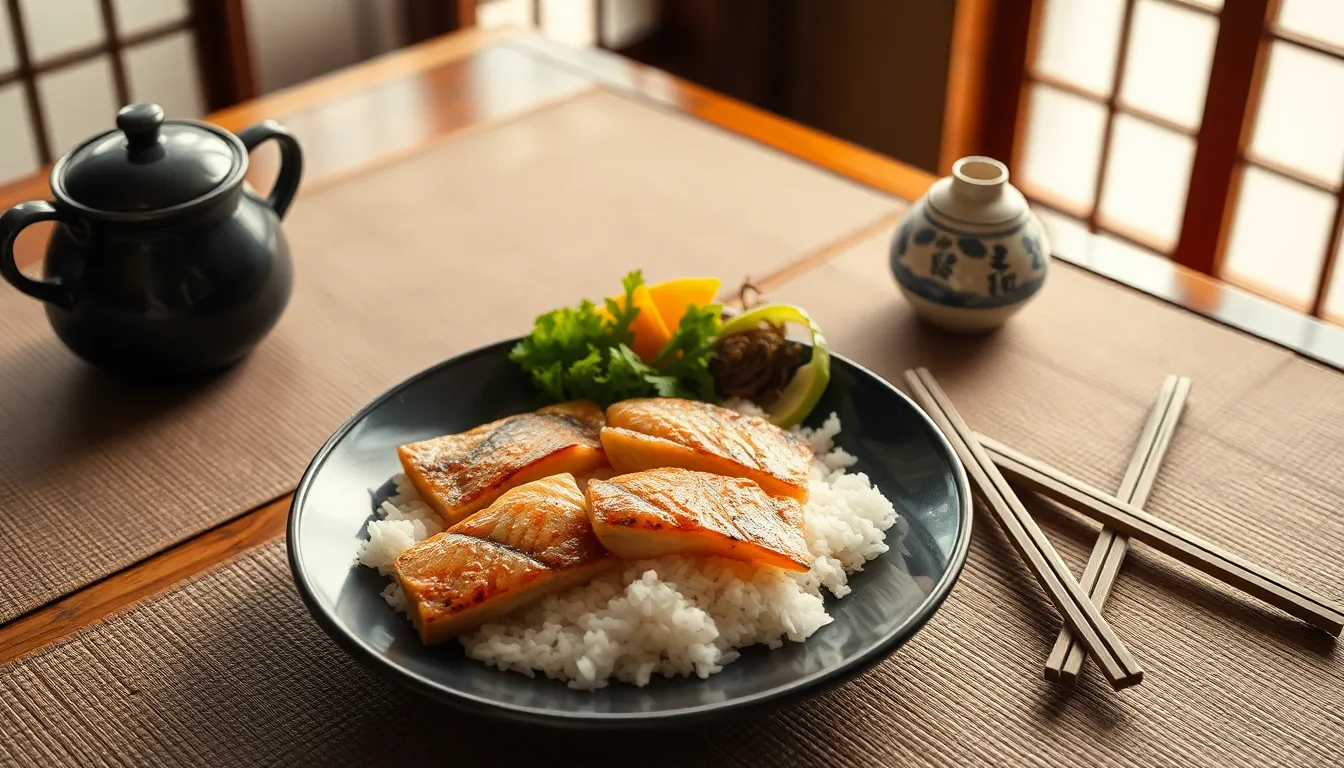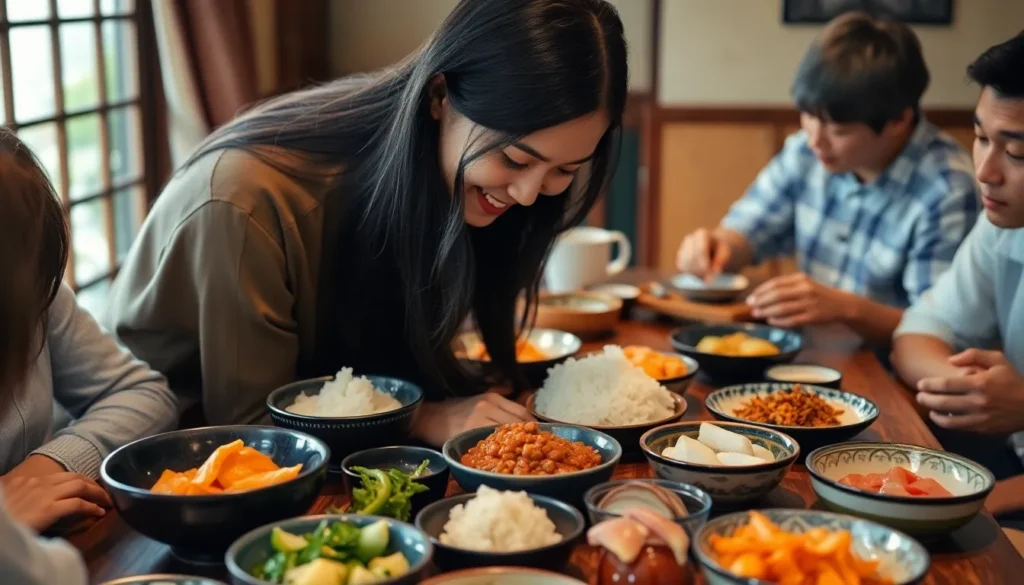Table of Contents
ToggleIn Japan, mealtime isn’t just about filling your belly; it’s a ritual steeped in tradition and respect. Before diving into a delicious spread of sushi, ramen, or tempura, the Japanese utter a phrase that captures their gratitude and appreciation for the meal ahead. This simple yet profound expression reflects a culture that values every bite as a gift from nature and the hands that prepared it.
So what do they say? It’s a phrase that might just tickle your taste buds and make you rethink your own dining habits. As we explore this delightful custom, get ready to discover the warmth behind these words and perhaps even inspire your next meal with a sprinkle of Japanese etiquette. After all, who wouldn’t want to elevate their dining experience with a touch of cultural flair?
Understanding Japanese Eating Etiquette
Japanese eating etiquette, deeply rooted in cultural values, emphasizes gratitude and respect. Before meals, people commonly say “Itadakimasu.” This phrase translates to “I humbly receive,” expressing thanks for the food and acknowledging everyone involved in its preparation.
Participants in meals often engage in rituals that go beyond mere dining. The communal aspect highlights togetherness and enjoyment. Sharing food enhances bonds among individuals present.
Staying mindful of these traditions fosters a deeper appreciation for Japanese culture. Using chopsticks properly is essential, as improper handling can offend hosts. Furthermore, it’s common practice to avoid pointing with chopsticks or sticking them upright in rice.
During the meal, individuals generally refrain from speaking while chewing. This practice reflects politeness and respect for others at the table. After finishing, it’s customary to say “Gochisousama deshita,” meaning “Thank you for the meal.” This acknowledgment completes the ritual of gratitude.
Dining experiences often vary based on the occasion. For formal events, following etiquette closely is crucial. In more casual settings, such as family meals, there may be slight deviations from traditional practices.
Learning these customs can enhance a visitor’s experience in Japan. Engaging in these rituals demonstrates respect for the culture and fosters positive interactions with locals. Each element of Japanese eating etiquette contributes to an enriched understanding of communal dining in Japan.
Common Phrases Used Before Eating

Japanese dining culture emphasizes specific phrases before meals, reflecting respect and gratitude. Two key expressions highlight this tradition.
Itadakimasu
“Itadakimasu” holds significant meaning in Japanese culture. Translated, it means “I humbly receive.” This phrase expresses appreciation for the food before a meal. It acknowledges the efforts of everyone involved in the meal preparation, from farmers to chefs. Saying “itadakimasu” also promotes mindfulness, encouraging diners to appreciate the flavors and presentations of their food. Acknowledging this phrase enhances the mealtime experience and reinforces cultural respect.
Other Phrases and Their Meanings
Several other phrases complement “itadakimasu.” “Arigatou gozaimasu” means “Thank you very much,” often directed toward the cook or host. Using this phrase expresses gratitude for the effort and care put into the meal. Another common phrase, “Oishii desu,” translates to “It’s delicious.” This expression demonstrates enjoyment during the meal, reinforcing the communal aspect of dining. Each phrase deepens the connection between diners and their food, highlighting the importance of respect in Japanese cuisine.
Cultural Significance of These Phrases
In Japan, the phrases used before meals signify deep respect and gratitude. They embody the essence of Japanese culture, promoting mindfulness while dining. Saying “Itadakimasu” not only expresses appreciation for the meal but also acknowledges the hard work put into its preparation, from the farmers who grew the ingredients to the cooks who skillfully crafted the dish.
Expressions like “Arigatou gozaimasu” and “Oishii desu” further illustrate the value placed on gratitude and connection. “Arigatou gozaimasu,” meaning “Thank you very much,” emphasizes appreciation for the people involved in providing the meal. Recognizing their efforts fosters a sense of community and shared experience. Similarly, complimenting food with “Oishii desu,” or “It’s delicious,” enhances the relationship between diners and their food.
These phrases create an atmosphere of respect at the dining table. They encourage participants to reflect on the meal’s significance beyond mere consumption. Recognizing the cultural importance of these expressions reveals layers of meaning in Japanese cuisine. Using them appropriately demonstrates an understanding of Japanese customs, which can strengthen bonds with local culture.
Furthermore, these expressions promote a communal dining experience. When diners vocalize their gratitude together, it reinforces a collective appreciation for the food and those who prepared it. Engaging in this ritual may enhance both personal enjoyment and social interaction during meals. Learning these phrases creates an enriched dining experience, reflecting the heart of Japanese hospitality.
Comparison with Other Cultures
Japanese dining customs emphasize gratitude and respect through phrases like “Itadakimasu.” In contrast, other cultures also exhibit unique pre-meal expressions reflecting their values. Western dining often involves informal greetings like “Enjoy your meal” or “Bon appétit,” which prioritize enjoyment without directly acknowledging the food’s preparation.
In many Latin American countries, a customary phrase before eating is “Buen provecho.” This expression conveys well-wishing to fellow diners but lacks the emphasis on the meal’s origins. African cultures, like those in Nigeria, use phrases such as “E ku ise,” meaning “Well done,” to appreciate the cook while honoring the meal’s significance.
Each culture showcases distinctive mealtime rituals that reveal their unique values. In Chinese culture, saying “Chī hǎo le” (Eat well) signifies that it’s time to eat but doesn’t capture the same depth of gratitude found in Japanese customs. Indian meals often start with “Bhojan shuru karte hain,” meaning “Let’s start the meal,” reflecting a communal spirit similar to Japan’s.
Moreover, many cultures engage in similar post-meal expressions. After dining, individuals in the Middle East often express gratitude with “Alhamdulillah,” which acknowledges God’s provision. Japanese phrases like “Gochisousama deshita” serve a parallel function, closing the meal with gratitude directed at all involved.
Cultural variations enrich the dining experience, highlighting different approaches to connection and respect. While Japan embodies gratitude through focused expressions, other cultures offer relatable, yet distinct ways to engage with mealtime, creating a rich tapestry of global dining etiquette.
Japanese dining customs reflect a profound appreciation for food and the effort behind its preparation. The practice of saying “Itadakimasu” before meals sets a tone of gratitude and mindfulness that enriches the dining experience. This ritual not only honors the meal itself but also fosters a sense of community among those sharing it.
As diners engage with phrases that express thanks and enjoyment, they deepen their connection to the food and each other. Embracing these customs can transform mealtime into a more meaningful occasion, highlighting the importance of respect in Japanese culture. By incorporating these practices, individuals can enhance their own dining experiences and cultivate a greater appreciation for the meals they share.




